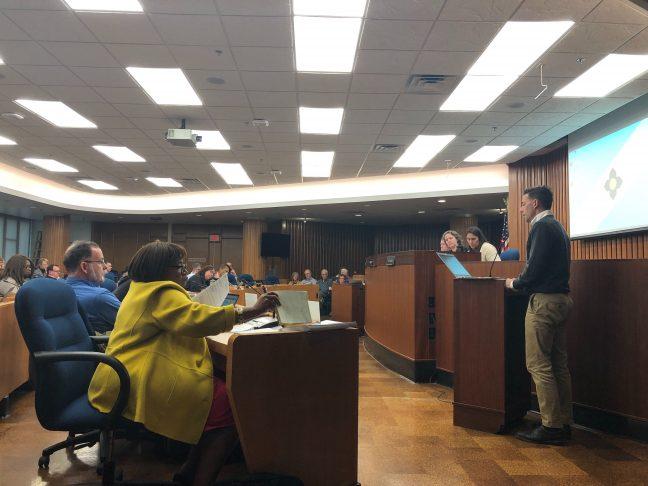Tuesday night the Madison City Council adopted an ordinance that would impose a vehicle registration fee of $40, effective February 1, 2020.
City finance director David Schmiedicke said the fee is estimated to bring in about $7.8 million annually. Under state law, this revenue must be used for transportation-related services.
The majority of these funds would be deposited in the city’s transit enterprise fund to be used for transit, replacing funding from the city’s general fund, Schmiedicke said.
Schmiedicke said $1.5 million would go toward expanded transit service and Bus Rapid Transit, a transit system that would make metro transit more efficient and accessible. This money would initially go to preparatory studies and then to operating costs.
The meeting began with public comment, where many speakers were concerned that the fee would place a larger burden on low-income residents.
Ald. Barbara Harrington-McKinney said she was also concerned with this possible inequity.
“There are many people who are struggling behind closed doors and this tax will definitely cause folks to fall through the cracks,” Harrington-McKinney said.
Eric Sundquist of State Smart Transportation Initiative said the wheel tax may not hurt residents of low income as much as people think. Sundquist said since the wheel tax is charged per car, residents with fewer cars or no cars will pay less. Since car ownership generally tracts with income, residents with higher incomes will be charged more.
The majority of public speakers were in support of the fee though they acknowledged it was not ideal.
Robbie Webber, a senior associate with the State Smart Transportation Initiative, said the wheel tax is the only option Madison has for funding BRT.
City transportation director Tom Lynch said the city is planning on submitting a Small Starts Grant, a grant awarded by the Federal Transit Administration that assists in improving transit systems.
Lynch said Madison needs the wheel tax to receive that grant as 50% of the decision is based on a local funding commitment, something Madison does not currently have without the tax.
Ald. Tag Evers said Madison needs to act on BRT now.
“Having visited Austin, Texas, and seeing how challenging it is to get around in a city that is not visionary with respect to transportation, I don’t want to be there 20 years from now,” Evers said.
Ald. Grant Foster proposed an amendment that would lower the tax to $35, but it failed. Harrington-McKinney also proposed an amendment lowering the tax to $20, but this also failed. Alds. Samba Baldeh and Sheri Carter proposed that the tax expires Jan. 31, 2026, and this also failed.
After much deliberation, the tax passed with a vote of 11-8, Mayor Satya Rhodes-Conway said she appreciated the careful consideration this issue was given and said the tax was not her first choice.
“While it may seem like it was me forcing you into tough choices, it is actually our financial situation that forces all of us into tough choices,” Rhodes-Conway said. “I don’t want us to miss our opportunity to invest in the things that will make us an even greater city than we already are.”


